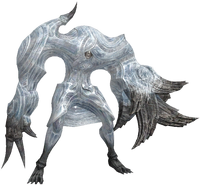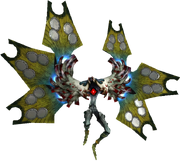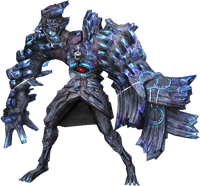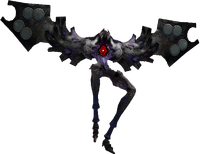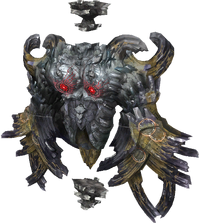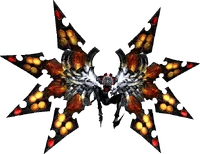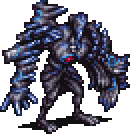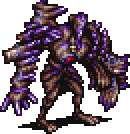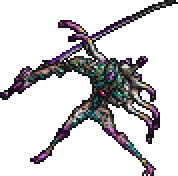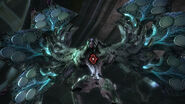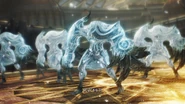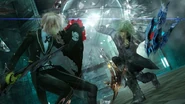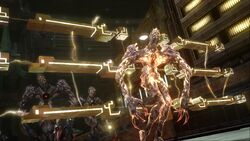
Ghoul Cie'th.
Cie'th (シ骸, Shi-gai?, lit. Cie Corpses) [siːθ] is a term from the Fabula Nova Crystallis: Final Fantasy series, appearing in Final Fantasy XIII, Final Fantasy XIII-2, Lightning Returns: Final Fantasy XIII and Final Fantasy Type-0. It refers to one of the two states that befall a l'Cie: those who fail to complete or unsuccessfully fight against their Focus.
Datalog[]
When a fal'Cie takes a human to be one of its l'Cie servants, that person is given a Focus to be completed. Should the l'Cie fail to fulfill this Focus before his or her brand advances to its final stage, that l'Cie becomes a Cie'th.
Mired in eternal sorrow and regret, and robbed of all free will, Cie'th are damned to wander the world unliving and undying, until their corrupted flesh at last can move no more. For Cie'th, there is no salvation.
Profile[]
Becoming a Cie'th[]
The Cie'th are the non-sentient remains of a former l'Cie. They move on instinct and are hostile toward living beings, including their former friends, which makes them widely feared as they can wield magic. This is especially true to The Undying, a group of Cie'th whose hatred towards their former fal'Cie masters has made them all the more dangerous. Only when they turn into Cie'th Stones do the Cie'th show some of their former humanity, mostly their regret of failing their Focus and asking somebody to complete it in their stead so they can rest in peace.
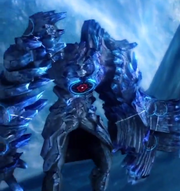
Ghast Cie'th.
When chosen by a fal'Cie, a l'Cie is marked with an incomplete brand, a tattoo-like inscription. The brand grows into its full form over time, working as a timer for the l'Cie to complete their Focus, a mission dictated by the fal'Cie that branded them. Should the l'Cie fail, or the time runs out, the l'Cie loses their humanity and crystals cover and twist their body. Their heart is sealed in endless despair, a fate more torturous than death.
The rate at which a l'Cie becomes a Cie'th depends on their psychological state: the more panicked and distressed, the faster they will turn. As time runs out the Pulse l'Cie brand sprouts arrows and eventually an eye, and when the eye is fully opened, the l'Cie transforms. Some l'Cie partially transform, taking on Cie'th-like qualities and sometimes keeping their minds. This state can be reversed with help from an outside agency. Fal'Cie can transform humans instantaneously into Cie'th by branding them without assigning them a Focus.
Orience Cie'th are former l'Cie who defied the Focus given to them by the Crystal of their respective nation. The Crystal transforms the l'Cie as punishment.
Appearance[]
The Cie'th are defined by their crystallized and deformed appearance. While most are humanoid, some are more monstrous. Most of their most notable protrusions are or resemble deformed arms, with some having a pair of hands covering where their "eyes" should be. Cie'th have no emotions, intelligence, or goals, and live trapped within their crystallized bodies. They have long claws instead of hands, but retain the facial features of their past selves. A pulsating red light in their chest keeps them alive. Upon closer look the face of the human the Cie'th was before is visible, twisted in pain and wailing silently.
Special Cie'th, like Raktavija, have two faces and also two brands, hinting that Cie'th can be formed from more than one person. Few to no Cie'th have their brands on other places than the torso or back, and some Cie'th, like the Seeker or Chonchon, have no visible brand.
The fal'Cie who created them seems to influence the Cie'th appearance. The Cie'th of Gran Pulse fal'Cie form black, rough crystals all over their body, while the Cie'th of Barthandelus, a Cocoon fal'Cie, have a body of smooth, white crystal.
Cie'th Stones[]
It is possible for Cie'th to still complete their Focus. Over the course of years, the Cie'th's energy dries out, and they turn into a crystalline tombstone, unable to move about but gaining the ability to communicate and ask others to complete their Focus for them. These Cie'th Stones are found in abundance throughout Gran Pulse.
The Undying[]
The powerful group of Cie'th known as The Undying have a unique appearance compared to the other Cie'th. They defy the will of the fal'Cie that made them into l'Cie and are filled with hatred toward everything that lives. In Final Fantasy XIII, completing a mission that has an Undying as a mark, normally allows the player to access a previously closed-off area, except for the first and last marks, which initiate and finish the series respectively.
Story[]
Final Fantasy XIII[]
When humans still populated Gran Pulse, the local fal'Cie branded many of them as l'Cie to take on various tasks, such as slaying powerful monsters. Many failed to follow through with their Focus and turned to Cie'th, and after humanity died out, the former sites of civilization became populated by roaming Cie'th with Cie'th Stones scattered throughout the land. The fal'Cie branding so many as l'Cie may have led to the Gran Pulse civilization dying out, with fewer and fewer people remaining compared to the Cie'th until only the latter were left.
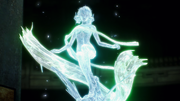
Vanille in crystal stasis.
During the War of Transgression, the fal'Cie Anima protected the village of Oerba, branding many of the villagers as l'Cie to fight Cocoon. Fang and Vanille's attack on Cocoon failed, and the pair was forced into a premature crystal stasis by the goddess Etro. Barthandelus, the leader of Cocoon's fal'Cie, brought Anima's throne into Cocoon with Fang and Vanille's crystals inside it. Having lost its patron fal'Cie, Oerba was left to fend for itself until its people died out, leaving only Cie'th roaming the streets.
Anima remained dormant within the Pulse Vestige on the shores of Bodhum inside Cocoon until Fang and Vanille come out of crystal stasis centuries later. Fang's brand is scorched but Vanille's is still active. The pair leaves the Vestige to explore Cocoon and look for a way to complete Vanille's Focus to prevent her from becoming a Cie'th. A local girl named Serah Farron finds the door leading inside the Vestige open and ventures inside, and Anima brands her a l'Cie with the Focus of turning into Ragnarok and laying waste to Cocoon.
Eight days later, after PSICOM, Cocoon's anti-Pulse military force, discovers the opening, a battalion ventures inside. Anima brands them all l'Cie, but they soon transform into Cie'th. Over the next two days, the fal'Cie takes Serah captive when she returns to learn the truth behind her Focus, and PSICOM seals the Vestige and moves it to the Hanging Edge. Serah's sister, Lightning, and Serah's fiancé, Snow Villiers, infiltrate the Vestige to save her, with Sazh Katzroy, Hope Estheim, and Vanille tagging along.
They find Serah who enters crystal stasis after asking Lightning to save Cocoon. The party confronts Anima who brands the party as l'Cie with Focus of turning into Ragnarok and destroying Cocoon. As PSICOM attacks the Vestige, the dying Anima falls into Lake Bresha, crystallizing it on impact, and the surviving Cie'th from the Vestige begin to roam around the lake. The newly-branded l'Cie escape unharmed, but little do they know Barthandelus is monitoring their every move, eager to see the l'Cie's Focus fulfilled.
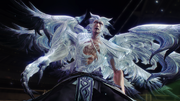
Cid Raines as a Cie'th.
After Barthandelus catches the l'Cie and sends them to the Fifth Ark to hone their skills, the party runs into Cid Raines. Raines is a Sanctum l'Cie branded by Barthandelus with Focus of helping the party destroy Cocoon. He defies his Focus and attempts to kill the party, partway transforming into a Cie'th. Before his transformation is complete, the Pulse l'Cie defeat him and he enters crystal stasis despite having defied his Focus. The sight of it inspires the Pulse l'Cie to also find a way to defy their Focus. After the party moves on, Barthandelus revives Raines from his crystal stasis and reverts his transformation into a Cie'th, instating him as a puppet primarch to incite a civil war in Cocoon.
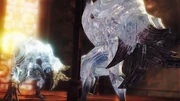
The Cavalry transformed into "Sacrifice" Cie'th.
The party escapes to Gran Pulse and finds it populated by Cie'th and monsters. They help some of the Cie'th Stones around by completing their Foci, but eventually return to Cocoon after learning of Barthandelus's plan to destroy Cocoon from the inside. The Cavalry deems Raines a traitor to their cause, and assassinates him before infiltrating Edenhall to attack Orphan, the fal'Cie they perceive to be in charge of enslaving mankind, when in reality, it is the fal'Cie that sustains all of Cocoon. The party follows them, but discovers the Cavalry turning into Cie'th as a result of Barthandelus branding them without a Focus.
The party defeats Barthandelus and Orphan awakens. Orphan wants the party to destroy it, but they refuse. Fang turns on the party, believing that the world is already doomed, and the shock from her betrayal transforms everyone but Vanille into Cie'th, who pile on Fang. The party reminisces everything they went through and revert their transformation, their l'Cie brands burning out. Though the party is unaware of it at this point, the reason why Lightning and her friends return to normal is because of goddess Etro's intervention. As Orphan has shown its true colors as an enemy of Cocoon, the party destroys it. Fang and Vanille combine their powers and transform into Ragnarok. They save Cocoon by crystallizing it and erecting a pillar of crystal to support it above Gran Pulse.
Final Fantasy XIII-2[]
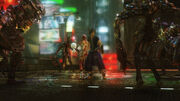
Serah and Noel surrounded by Cie'th in Academia 400 AF.
After the Day of Ragnarok, Cie'th become scarce, as there are few fal'Cie who brand l'Cie anymore and mankind again populates Gran Pulse. In one future in the year 400 AF, the Proto fal'Cie Adam uses Cie'th as enforcers to wipe out any opposition to it, but as Serah and Noel fix the paradoxes across the timeline, this future is eradicated.
Lightning Returns: Final Fantasy XIII[]
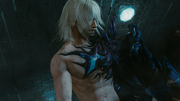
Snow's transformation.
After Chaos is released into the mortal realm, Cie'th are all but gone from the land that is left, Nova Chrysalia. Snow, the last remaining l'Cie in the world, partway transforms into a Cie'th after absorbing a mass of Chaos he had been keeping under control at the heart of the Patron's Palace in Yusnaan, but Lightning reverses his transformation by giving him hope for the future. The god Bhunivelze begins crafting a new ultimate life form to replace humanity with in case they do not meet his high standards, and the creature he forms in the Ultimate Lair, Ereshkigal, resembles a Cie'th. However, Lightning slays it.
Final Fantasy Type-0[]
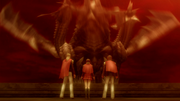
Celestia becomes a Cie'th.
The four Crystals of Orience choose l'Cie, usually from the populaces of their own Crystal-Nations, and give them a Focus without a time limit. Should the l'Cie fail they will turn into Cie'th. After the Militesi Empire annihilates Lorican Alliance with the Ultima Bomb, some cadets in Akademeia ponder if the Black Tortoise l'Cie were turned to Cie'th for being unable to protect their Crystal, but ultimately have no way of knowing what the l'Cie's exact Focus was. Celestia temporarily assumes a Cie'th form before permanently remaining in that state after defying her Focus by letting Class Zero reach Pandæmonium. Class Zero also fights a Cie'th-like Gilgamesh during their trials in Pandæmonium.
The Dracobaltians' fate can be seen as equivalent of a fate of a Cie'th. As per legend, they were cursed over their blasphemy to their Crystal and turned into bloodthirsty monsters. Unable to ease their suffering, the Dracobaltians attack anyone on sight.
List of Cie'th[]
Shambling Cie'th[]
- Fomoire (XIII-2)
- Ghast (XIII, XIII-2)
- Ghoul (XIII, XIII-2)
- Malebranche (XIII-2)
- Sacrifice (XIII)
- Strigoi (XIII, XIII-2)
- Taxim (XIII, XIII-2)
- Vampire (XIII, XIII-2)
Winged Cie'th[]
- Cocytus (XIII-2)
- Chonchon (XIII, XIII-2)
- Edimmu (XIII)
- Nelapsi (XIII, XIII-2)
- Penanggalan (XIII)
- Pijavica (XIII)
- Varcolaci (XIII)
- Wight (XIII)
Unusual Cie'th[]
The Undying[]
- Attacus (XIII)
- Bituitus (XIII)
- Geiseric (XIII, XIII-2)
- Gorgyra (XIII-2)
- Mithridates (XIII)
- Numidia (XIII)
- Raspatil (XIII-2)
- Syphax (XIII)
- Vercingetorix (XIII)
- Wladislaus (XIII, XIII-2)
- Yomi (XIII-2)
- Zenobia
- Vaballathus (XIII-2)
Other[]
- Cid Raines (XIII)
- Snow Villiers (Lightning Returns)
- Snow Villiers+ (Lightning Returns)
- Snow Villiers++ (Lightning Returns)
- Ereshkigal (Lightning Returns)
- Shinryu Celestia (Type 0)
Other appearances[]
Final Fantasy XIV[]
The Cie'th Mithridates appears as the second boss of the level 80 dungeon The Twinning.
Dissidia Final Fantasy NT[]
Snow appears as a Warrior of Spiritus as a Cie'th.
Dissidia Final Fantasy Opera Omnia[]
Cie'th from Final Fantasy XIII appear as regular enemies from Chapter 9 forward. They are resistant to Melee and Ranged attacks, but vulnerable to Magic.
Pictlogica Final Fantasy[]
Some of the Cie'th from Final Fantasy XIII appear as enemies.
Final Fantasy All the Bravest[]
Some of the Cie'th from Final Fantasy XIII appear as enemies.
Final Fantasy Record Keeper[]
Some of the Cie'th from Final Fantasy XIII appear as enemies.
Mobius Final Fantasy[]
Behind the scenes[]
Cie'th are one of few genera that cannot be recruited into the party via Paradigm Pack system in Final Fantasy XIII-2; others are bosses. While both Geiseric and Wladislaus were originally classified as Undying in Final Fantasy XIII, they are reclassified as ordinary Shambling Cie'th in Final Fantasy XIII-2.
Cie'th almost always have a weakness to either elements or magic spells.
An unused Cie'th design for Final Fantasy XIII-2 is used as optional superboss Ereshkigal in Lightning Returns: Final Fantasy XIII.
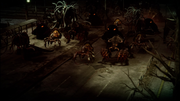
Daemon army in Final Fantasy XV.
The daemons in Final Fantasy XV hearken to the concept of the Cie'th from Fabula Nova Crystallis games. Final Fantasy XV was originally part of the subseries under the name Final Fantasy Versus XIII, although the terms l'Cie, fal'Cie and Cie'th were not going to be used. Daemons are born of souls corrupted by darkness, and normal humans can become daemons. Ravus's daemon form resembles both Cid Raines's Cie'th form from Final Fantasy XIII and Snow's Cie'th form from Lightning Returns: Final Fantasy XIII. The daemons' Japanese name, (シガイ, Shigai?), is also pronounced identically to the Japanese name for Cie'th.
Gallery[]
Etymology[]
死 (shi?) is a Japanese word meaning "death". Words containing the Japanese syllable shi (hiragana: し; katakana: シ) are sometimes associated with death (e.g. the number 4 (四, shi, yon?)). "Cie'th" is likely a combination of the words "Cie" and "death".
Many Cie'th in the Lightning Saga are named after mythological creatures related to death.
- The Nelapsi is an often-naked vampire from Slovakia that drinks blood from victims after crushing their bones.
- A Varcolac is a werewolf from Romanian mythology.
- A vetala is a vampiric being from Hindu mythology. They are spirits who possess corpses.
- In Romanian mythology, Strigoi are the troubled souls of the dead rising from the grave. Some strigoi can be living people with magical properties, including the ability to transform into an animal, invisibility, and the propensity to drain the vitality of victims via blood loss. Strigoi are also known as immortal vampires. In Romanian, striga means "scream."
- Penanggalan, also known as Hantu Penanggal, is a variation of the vampire myth that originated from the Malay Peninsula. Hantu Penanggal appear as beautiful women in the day, but come nighttime they detach their heads and bring their stomach and entrails along as they fly through the sky in search of newborns and mothers-in-labor to feed on their blood. "Penanggalan" comes from the Malay root word tanggal, meaning "detach." There is also a Filipino mythical creature called Manananggal (literally "Detacher").
- Raktavija is an asura (demon) of Hindu mythology who would duplicate himself whenever a drop of his blood touched the ground. His name can be translated to "blood-seed."
Most of the Undying are named after enemies of the Roman Empire, except from Wladislaus, which is named after a Polish king.
- Bituitus is the name of a Gallic king and an enemy of Rome.
- Geiseric is another spelling of Genseric, the 5th century king of Vandals and Alans that played a key role in the ultimate demise of the Western Roman Empire.
- Mithridates was the name of many ancient kings. The most famous was Mithridates VI of Pontus, an enemy of Rome. Mithridates VI was a king who built up an immunity to poison, and referring to this, the Mithridates enemy in Final Fantasy XIII is one of the few enemies immune to all status ailments.
- Syphax was a king of an ancient Libyan tribe in Numidia. He was an enemy of Rome.
- Numidia is an ancient kingdom in what is now modern-day Algeria that once waged war against the Roman Empire.
- Zenobia was a third century Syrian queen of the Palmyrene Empire who led a revolt against the Roman Empire.
- Attacus's Japanese name is Spartacus. Spartacus was the most notable leader of a slave revolt against the Roman Republic.
- Vercingetorix was a chieftain of the Arverni tribe during an unsuccessful revolt against Roman Forces during the last stage of Julius Caesar's Gallic Wars.

